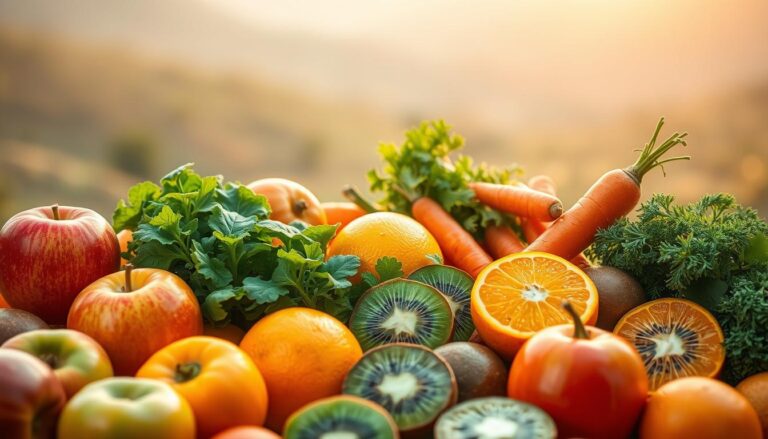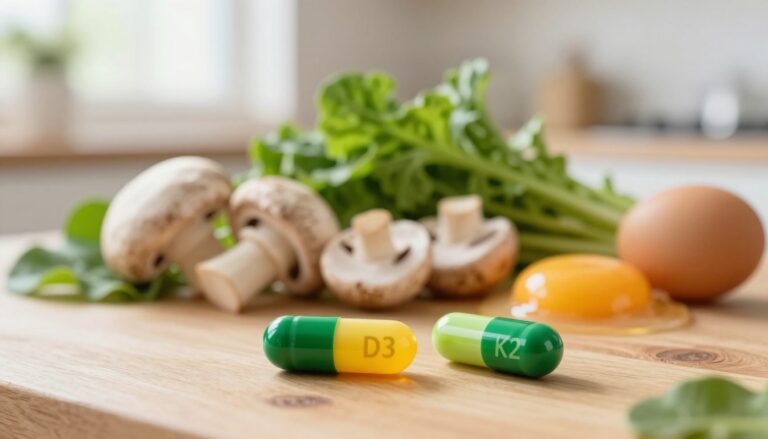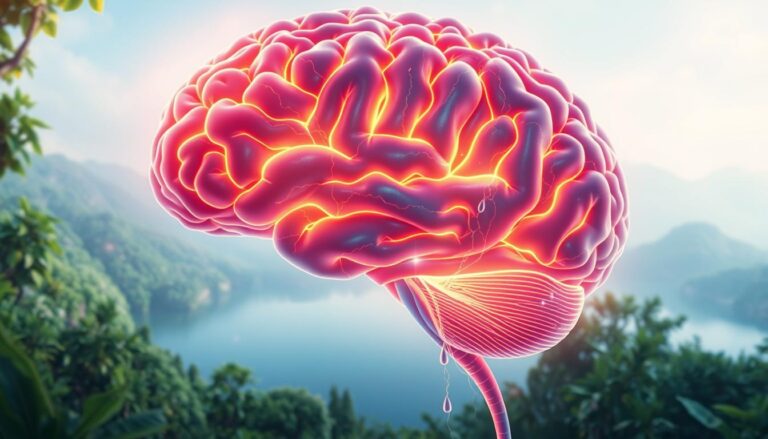Do you know how important electrolytes are for your health? These minerals like sodium and potassium, help your nerves and muscles work right.
They also keep your body’s pH levels balanced and help you stay hydrated. Luckily there are many natural foods that are full of these essential nutrients.
Key Takeaways
- Electrolytes are essential minerals that carry an electric charge and play critical roles in the body.
- A variety of foods, including bananas, avocados, sweet potatoes, and leafy greens, are excellent sources of electrolytes.
- Electrolyte-rich foods can help prevent issues like dehydration, muscle cramps, and irregular heartbeat.
- Whole foods and natural beverages like coconut water are better alternatives to high-sugar sports drinks for electrolyte replenishment.
- Ensuring adequate electrolyte intake is important for athletes, the elderly, and those recovering from illness or engaging in strenuous activity.
Introduction to Electrolytes and Their Importance
Electrolytes are minerals with an electrical charge. They are key to many bodily functions. They help make energy keep us hydrated, and help muscles work, including the heart.
The main electrolytes in our bodies are sodium, phosphate potassium calcium magnesium, chloride, and bicarbonate.
What are Electrolytes?
Electrolytes are important minerals that have an electric charge. They are found in body fluids like blood urine, and sweat. They help control fluid levels, send nerve signals, and build new tissue.
They also help with blood clotting, keep the heart beating right, and keep the body’s pH level balanced.
The Role of Electrolytes in the Body
- Fluid Balance: Electrolytes keep the right amount of fluid in and around cells, making sure we stay hydrated.
- Muscle and Nerve Function: Sodium potassium, and calcium are key for muscle contractions and nerve signals.
- pH Regulation: Electrolytes like bicarbonate help keep the body’s pH level just right for many processes.
- Cardiovascular Health: Potassium and calcium are important for a healthy heart rhythm and blood pressure.
- Bone Health: Calcium and phosphate are crucial for strong bones.
Keeping the right balance of electrolytes is key for good health. Not having enough can cause muscle cramps, weakness, and other problems. Eating foods rich in electrolytes and drinking plenty of water can help avoid these issues.

Bananas A Potassium Rich Powerhouse
Bananas are packed with potassium, a key electrolyte. This mineral helps control fluid balance, nerve function, and muscle contractions. It also keeps blood pressure healthy, making bananas great for your heart.
A medium banana has about 400-450 milligrams of potassium. That’s about 12% of what we need daily. A ripe banana has even more, around 422 milligrams, helping meet our body’s needs.
Potassium relaxes blood vessels and controls sodium. This can lower the risk of high blood pressure and heart problems. It also helps muscles work better, reducing cramps and fatigue, and improving sports performance.
Bananas are not just about potassium. They also have magnesium for heart health and fiber for digestion. Plus, they’re full of antioxidants that fight heart disease.
Eating bananas is easy and cheap. They’re great as a snack in smoothies, or in recipes. They’re a nutritious way to keep your body healthy and balanced.
| Nutrient | Amount per Medium Banana | % Daily Value |
|---|---|---|
| Potassium | 422 mg | 12% |
| Calories | 112 | – |
| Fat | 0g | 0% |
| Protein | 1g | 2% |
| Carbohydrates | 29g | 10% |
| Fiber | 3g | 11% |
| Vitamin C | 12% | – |
| Magnesium | 8% | – |
Bananas are a top source of potassium. They support heart health muscle function, and overall well-being. Adding them to your diet helps meet your daily electrolyte needs.
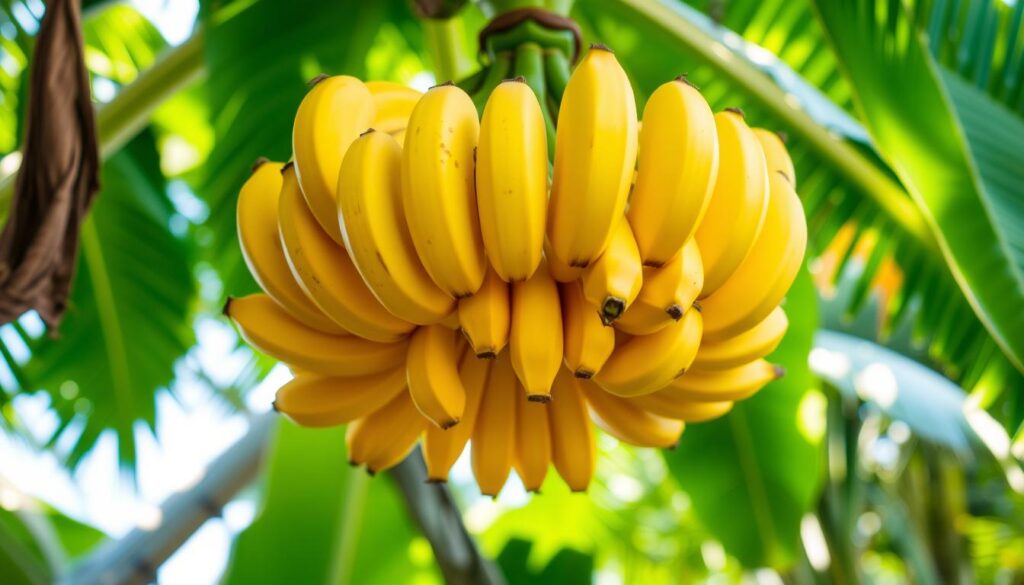
Potassium is crucial for regulating fluid balance, nerve function, and muscle contractions. Bananas are a fantastic source of this essential electrolyte.
Avocados A Delicious Source of Potassium and Magnesium
Avocados are packed with potassium and magnesium, key electrolytes. Potassium helps control fluid balance, heart function, and blood pressure. Magnesium is crucial for muscle and nerve function, blood sugar control, and blood pressure.
Avocado’s Nutrient Profile
Half an avocado gives you 7% of the Daily Value DV of potassium. A whole avocado gives almost 15%. They also have a lot of magnesium. A medium avocado has about 58 mg, or 14% of the DV.
Benefits of Avocados for Electrolyte Balance
Avocados are not just good for electrolytes. They also have healthy fats that help absorb vitamins. This makes them a tasty way to get electrolytes. The potassium in them helps with muscle function and nerve function. The magnesium supports heart health and hydration.
| Nutrient | Amount in 1 Medium Avocado | Percentage of Daily Value DV |
|---|---|---|
| Potassium | 690 mg | 15% |
| Magnesium | 58 mg | 14% |

Avocados are a nutritional powerhouse, providing a wealth of essential electrolytes like potassium and magnesium that are vital for optimal health.
Sweet Potatoes A Nutritional Goldmine
Sweet potatoes are packed with electrolytes like potassium and magnesium. These nutrients are key for a healthy heart, blood pressure, and blood glucose levels.
Potassium is important for heart health and blood pressure. Sweet potatoes have over 400 milligrams of potassium per medium sized potato. This helps balance sodium and supports a healthy heart.
Magnesium is also found in sweet potatoes. It helps with muscle and nerve function, blood glucose control, and blood pressure regulation. A medium sweet potato has about 37 milligrams of magnesium.
Sweet potatoes are not just good for electrolytes. They are also full of fiber, vitamins, and antioxidants. Adding them to your meals can boost your health and electrolyte intake.

Spinach and Kale Leafy Greens Packed with Electrolytes
Spinach and kale are top picks for foods rich in electrolytes. These leafy greens are packed with minerals that are key for good health.
The Impressive Nutrient Profiles of Spinach and Kale
Spinach is a great source of potassium. This electrolyte is important for heart health, blood pressure, and nerve signals. One cup of raw spinach has over 170 mg of potassium, helping keep electrolytes in balance. It also has a lot of magnesium, which is good for bones and muscles.
Kale is also rich in electrolytes. It’s full of calcium, which is essential for strong bones and teeth. Kale also has lots of potassium, helping the heart and nerves. Eating kale ensures your body gets the electrolytes it needs.
| Nutrient | Spinach 1 cup, raw | Kale 1 cup, raw |
|---|---|---|
| Potassium | 174 mg | 141 mg |
| Magnesium | 24 mg | 30 mg |
| Calcium | 30 mg | 93 mg |
Eating spinach and kale boosts your electrolyte intake. This supports your overall health and well-being.

Beans and Lentils Fiber Rich and Electrolyte Packed
Beans and lentils are true champions when it comes to electrolytes. They are not just packed with minerals like potassium and magnesium. They also have a lot of fiber making them a nutritional double whammy.
These legumes are great sources of potassium. Potassium is key for blood pressure, nerve function, and muscle contractions. Just one cup of cooked lentils provides a whopping 731 milligrams of potassium, which is around 20% of the recommended daily intake.
But there’s more. Beans and lentils are also full of magnesium. Magnesium is important for heart health muscle function, and digestion. A single cup of cooked kidney beans contains approximately 365 milligrams of magnesium, surpassing the recommended daily intake for women.
Their high fiber content adds to their health benefits. It helps keep the gut healthy and aids digestion. This mix of electrolytes and fiber makes them a true powerhouse for well-being.
So, next time you want to boost your electrolyte intake try beans or lentils. Your heart, muscles, and gut will appreciate it!
Beans and lentils are a nutritional powerhouse, providing a winning combination of electrolytes and fiber for optimal health.
Pistachios A Nutty Delight with Electrolyte Benefits
Pistachios are more than just a tasty snack; they are a natural powerhouse of electrolytes. These versatile nuts are a rich source of the essential minerals potassium and magnesium. These minerals are key to maintaining the body’s electrolyte balance.
Potassium is vital for heart health and blood pressure. Magnesium supports nerve signals and muscle function. Together they ensure the body’s processes run smoothly.
Beyond their electrolyte content, pistachios are also packed with plant based protein, healthy fats and antioxidants. This makes them a great addition to a balanced diet. They’re perfect as a snack a salad topping or in baked goods.
The Versatility of Pistachios
Pistachios can be enjoyed in many ways, making them a convenient and nutritious choice. From roasted and salted to delicately flavored, they add a delightful crunch. They’re also great in recipes, from savory dishes to sweet desserts.
Looking for a nutrient-dense snack or a flavorful ingredient? Pistachios are a must-have in your pantry. They offer a nutty delight and electrolyte benefits that are remarkable.
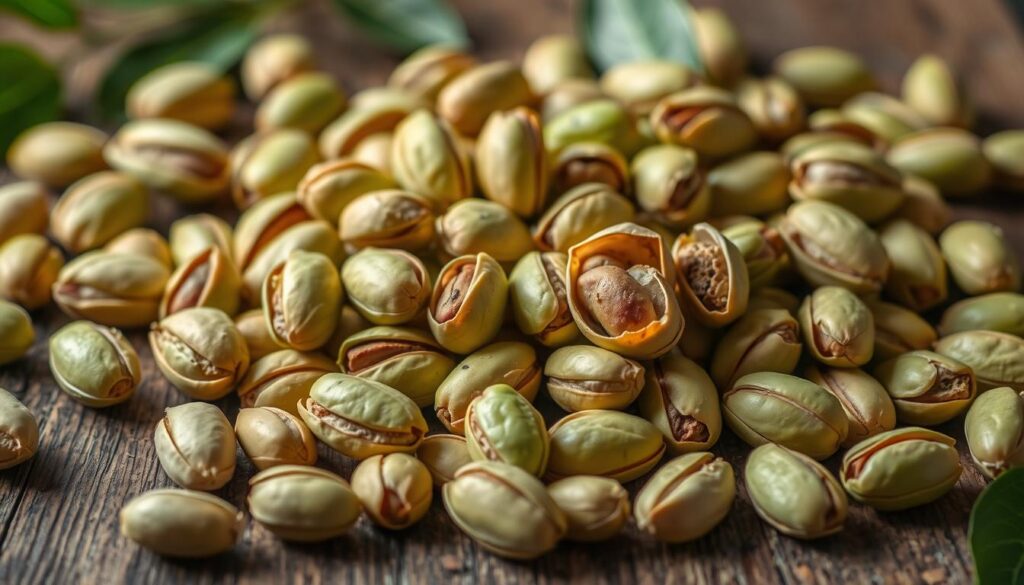
What are the 10 foods that contain the most electrolytes?
Electrolytes are key minerals that help keep our fluids balanced, nerves working right, and muscles healthy. Luckily, there are many top electrolyte-rich foods that can help us get the electrolytes we need. Here are the 10 foods that are especially good at providing these important nutrients.
- Bananas – Bananas are full of potassium, making them great for sports nutrition and recovery foods.
- Avocados – Avocados are packed with potassium and magnesium. These are key electrolytes for keeping our fluid balance right and supporting heart health.
- Sweet Potatoes – These colorful tubers are full of potassium and magnesium. They’re important for nerve function and muscle contraction.
- Spinach and Kale – Leafy greens like spinach and kale are full of electrolyte-rich nutrients. They have potassium, magnesium, and calcium, which are good for our overall health.
- Beans and Lentils – Legumes are not just high in fiber. They also have a lot of electrolytes like potassium and magnesium. These are important for keeping our fluids balanced and muscles working well.
Other foods rich in electrolytes include pistachios, yogurt, strawberries, bone broth, and coconut water. Adding a variety of these electrolyte sources to your electrolyte-rich diet can help keep your electrolyte balance right. This supports your health and fitness goals.
Electrolytes are the unsung heroes of our bodies, playing a vital role in maintaining optimal function. By embracing a diet rich in these essential nutrients, we can unlock the path to better health and peak performance.
Yogurt A Dairy Delight Rich in Electrolytes
Yogurt is packed with nutrients, including key electrolytes. These electrolytes are vital for your health. They help with bone health, muscle function, and nerve signals.
A 7-ounce container of plain, low fat Greek yogurt has a lot of potassium, phosphorus, and magnesium. It also has a good amount of calcium. This makes yogurt a great source of electrolytes.
The Electrolyte Profile of Yogurt
- Calcium: Yogurt is full of calcium, with 274 milligrams in a 7-ounce serving. Calcium is key for strong bones and teeth, and it helps muscles and nerves too.
- Potassium: A 7-ounce yogurt has 282 milligrams of potassium. Potassium helps with fluid balance, muscle contractions, and nerve signals.
- Magnesium: Yogurt gives you 22 milligrams of magnesium per 7-ounce serving. Magnesium is good for bones, muscles, and energy.
- Phosphorus: Yogurt has 274 milligrams of phosphorus in a 7-ounce serving. Phosphorus is important for bone health, energy, and tissue repair.
Eating yogurt is a tasty way to get the electrolytes your body needs. It helps keep you healthy and feeling good.
Strawberries A Sweet Treat with Electrolyte Power
Strawberries are not just tasty but also packed with antioxidants. They are a great source of potassium and magnesium. These minerals help keep our fluids balanced, nerves working, and our hearts healthy.
One cup of strawberries gives you 233 mg of potassium. This helps replace what’s lost through sweat or illness. Potassium is key for nerve signals, muscle movements, and blood pressure control. Strawberries also have 20 mg of magnesium, which is good for muscles, nerves, and blood sugar.
Eating strawberries is a tasty way to get more electrolytes. You can have them fresh, in smoothies, or salads. They’re a yummy way to keep your body running smoothly.
Strawberries are not only a delightful treat, but they’re also a powerhouse of essential electrolytes like potassium and magnesium, which are crucial for maintaining optimal bodily function.
So, when you want something sweet pick strawberries. They’re not just tasty but also help keep your body’s electrolytes in check.
Bone Broth and Coconut Water: Nature’s Hydrating Elixirs
Bone broth and coconut water are top choices for replenishing electrolytes and staying hydrated. They are packed with essential minerals and electrolytes that boost health and well-being.
Bone broth is full of minerals like calcium, magnesium, phosphorus, and potassium. It also has collagen, which is good for you.
Drinking bone broth can help with digestion, reduce inflammation, and strengthen your bones and joints. You can enjoy it on its own, in recipes, or even freeze it into ice cubes to add nutrition to drinks and dishes.
Coconut water is rich in potassium, magnesium, and sodium. It’s great for replacing lost electrolytes, especially after working out. One cup of 100% watermelon juice has almost 6% of the Daily Value for potassium and magnesium. It’s a hydrating and electrolyte-rich choice.
Unlike sugary sports drinks, bone broth and coconut water are natural and full of nutrients. They can be added to many recipes, like smoothies, power bowls, dips, and sauces. This gives you a tasty and healthy way to improve your health and wellness.
Bone broth and coconut water are nature’s gift, providing essential electrolytes and minerals to support optimal hydration and overall well-being.
Conclusion
Keeping a balanced electrolyte rich diet is key for good health. Foods like bananas, avocados, and sweet potatoes are full of important electrolytes. These include potassium, magnesium, calcium, and sodium.
Adding these electrolyte rich foods to your meals helps a lot. They support hydration muscle and nerve function, and heart health. This is good for your body’s overall function.
Choosing a variety of electrolyte rich foods is smart. It’s especially good for sports nutrition and active lives. It helps you stay healthy and perform better whether you’re an athlete or just want to feel your best.
In short, knowing how vital electrolytes are and eating electrolyte-rich foods daily is empowering. It helps you stay hydrated supports muscle and nerve health and keeps your heart strong. This leads to better physical and mental health overall.
